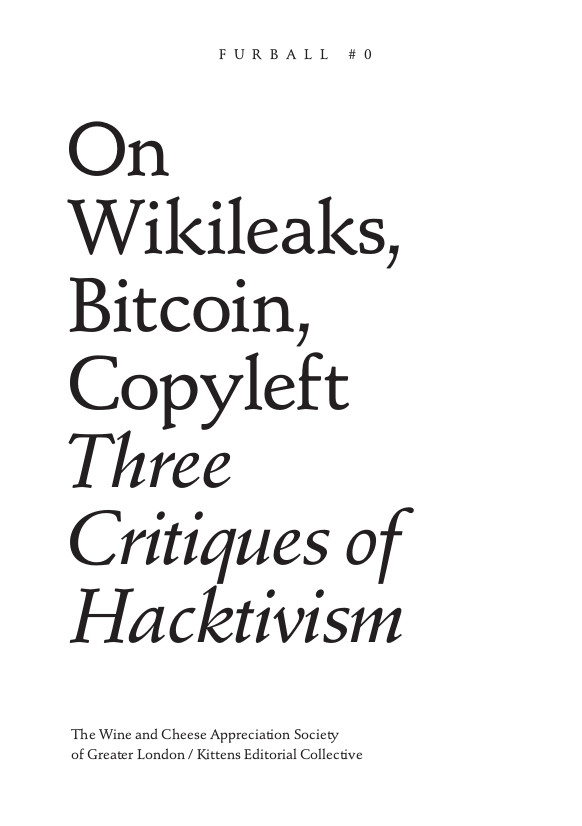Giovanni Ziccardi: Resistance, Liberation Technology and Human Rights in the Digital Age (2013)
Filed under book | Tags: · activism, censorship, crowdsourcing, cyberwar, facebook, hacking, hacktivism, human rights, internet, internet activism, liberation technologies, open data, politics, resistance, social media, surveillance, technology, transparency, twitter, wikileaks

This book explains strategies, techniques, legal issues and the relationships between digital resistance activities, information warfare actions, liberation technology and human rights. It studies the concept of authority in the digital era and focuses in particular on the actions of so-called digital dissidents. Moving from the difference between hacking and computer crimes, the book explains concepts of hacktivism, the information war between states, a new form of politics (such as open data movements, radical transparency, crowd sourcing and “Twitter Revolutions”), and the hacking of political systems and of state technologies. The book focuses on the protection of human rights in countries with oppressive regimes.
– Deals with digital resistance activities all over the world
– First book to describe political and human rights issues in Egypt, Tunisia, Cuba and Yemen
– A critical analysis of the WikiLeaks case
Publisher Springer, 2013
Volume 7 van Law, Governance and Technology series
ISBN 9400752768, 9789400752764
328 pages
via Marcell Mars via Jaromil
Furball 0: On Wikileaks, Bitcoin, Copyleft: Three Critiques of Hacktivism (2013)
Filed under booklet | Tags: · bitcoin, capitalism, copyleft, critique, free software, hacktivism, money, software, wikileaks

“While most expressions of hacktivism lack this revolutionary vigour expressed in one of the later communiques by now infamous hacking collective AntiSec, hacktivism is widely appreciated for its radical potential. Wikileaks and hacking crews are considered by some as anarchist special forces striking blows against the forces of domination. Bitcoin is regarded as a practical approach to break the power of capital. Free software is thought of as a model for future production beyond capitalism. We disagree.
This booklet collects our writings on activism in the digital realm produced over the last few years. In our piece on Wikileaks — which first appeared in Kittens #1 — we critique Wikileaks’ appreciation of the bourgeois-democratic state which persecutes it. The article on Bitcoin — which previously appeared in Mute Magazine Vol. 3, No. 3 — deals with the political economy of the digital currency and critiques the Libertarian ideology driving it. Finally, our piece on free software and other digital commons — which has not previously been published — portrays how ‘copyleft’ software licences are still expressions of appreciation for the social conditions we are forced to live under.
All three pieces critique both the fallacies inherent in the reasoning behind these projects as well as left-wing hopes attached to them. As such, it might strike the reader as arrogant sneering from the sidelines. However, this is not the intent of this work. We hold that the project of transforming the existing social conditions must start from a correct understanding of these conditions to avoid reproducing them. In this spirit, this booklet is an invitation to critique.” (from the Foreword)
Publisher The Wine & Cheese Appreciation Society of Greater London, London, January 2013
46 pages
via Marcell, via Anthony
Rodolphe Durand, Jean-Philippe Vergne: The Pirate Organization: Lessons from the Fringes of Capitalism (2010/2012)
Filed under book | Tags: · biopiracy, capitalism, economics, hacking, hacktivism, piracy, pirate radio

When capitalism spread along the trade routes toward the Indies…when radio opened an era of mass communication…when the Internet became part of the global economy…pirates were there. And although most people see pirates as solitary anarchists out to destroy capitalism, it turns out the opposite is true. They are the ones who forge the path. In “The Pirate Organization,” Rodolphe Durand and Jean-Philippe Vergne argue that piracy drives capitalism’s evolution and foreshadows the direction of the economy. Through a rigorous yet engaging analysis of the history and golden ages of piracy, the authors show how pirates form complex and sophisticated organizations that change the course of capitalism. Surprisingly, pirate organizations also behave in predictable ways: challenging widespread norms; controlling resources, communication, and transportation; maintaining trade relationships with other communities; and formulating strategies favoring speed and surprise. We could learn a lot from them–if only we paid more attention. Durand and Vergne recommend that rather than trying to stamp out piracy, savvy entrepreneurs and organizations should keep a sharp eye on the pirate space to stay successful as the game changes–and it always does. First published in French to great critical acclaim and commercial success as “L’Organisation Pirate: Essai sur l’évolution du capitalisme,” this book shows that piracy is not random. It’s predictable, it cannot be separated from capitalism, and it likely will be the source of capitalism’s continuing evolution.
First published in French as L’Organisation Pirate: Essai sur l’évolution du capitalisme, Éditions Le Bord de l’Eau, Lormont, 2010
Publisher Harvard Business Review Press, Boston/MA, 2012
ISBN 1422183203, 9781422183205
208 pages
review (The Economist)
authors
publisher
google books
PDF (MOBI)
Watch the accompanying movie (What Is the Pirate Organization? by Daniel Wyatt, 5 min.)

